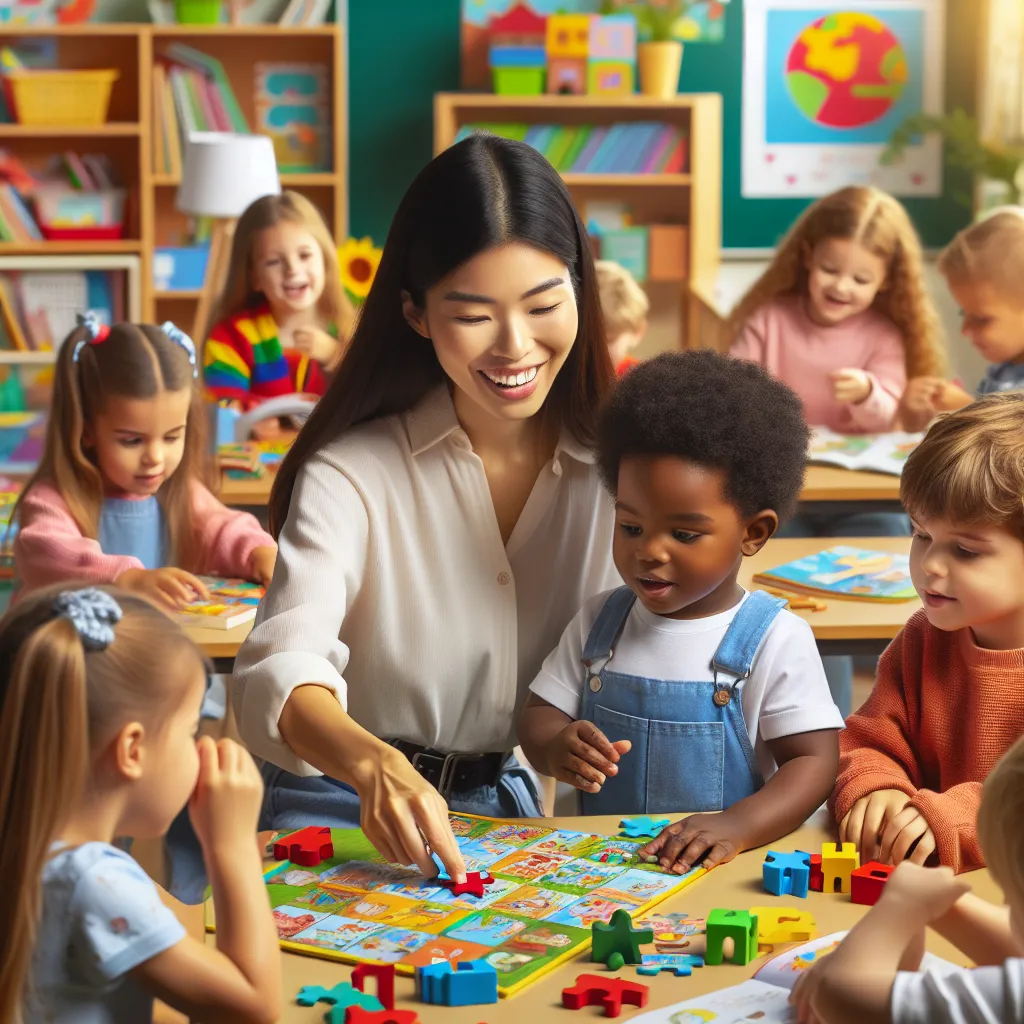Ask AI on The Internet
Question: drawing upon Vygotsky's social theory as a framework , argue the significance of play in fostering language development in foundation phase learners
Vygotsky's social theory, particularly his ideas about the Zone of Proximal Development (ZPD) and the role of social interaction in cognitive development, provides a robust framework for understanding the significance of play in fostering language development in foundation phase learners (typically children aged 4-8 years). ### Key Principles of Vygotsky’s Social Theory 1. **Zone of Proximal Development (ZPD)**: This concept refers to the difference between what a child can do independently and what they can achieve with guidance and encouragement from a skilled partner. 2. **More Knowledgeable Other (MKO)**: This term describes someone who has a better understanding or a higher ability level than the learner, which can be a teacher, parent, or peer. 3. **Social Interaction**: Vygotsky posited that cognitive functions are developed from social interactions. He emphasized that learning is inherently a socially mediated activity. ### The Role of Play in Language Development 1. **Scaffolding Language Skills within the ZPD** - During play, adults and more knowledgeable peers naturally provide scaffolding. For instance, when children engage in role-play (such as playing 'shop'), an adult might introduce new vocabulary and concepts related to commerce, expanding the child’s language use and comprehension within their ZPD. 2. **Enhancement of Social Interaction** - Play often involves dialogue, negotiation, and collaboration, which are intrinsic to social interaction. Through these play activities, children practice verbal exchanges, learn to take turns in conversation, and develop pragmatic language skills such as understanding context, tone, and non-verbal cues. 3. **Contextualized Learning** - Play provides a contextual and meaningful environment for language use. Children are more likely to remember and use new words and phrases that are learned in context. For example, while playing house, children might use words and phrases related to family life, household items, and daily routines. 4. **Imaginative Play and Narrative Skills** - Imaginative play, such as storytelling or pretend play, allows children to experiment with language creatively. They learn to construct narratives, use descriptive language, and practice different speech roles, all of which enhance their expressive language skills. 5. **Peer Interaction** - When children play together, they are required to communicate effectively to share ideas and achieve common goals. This peer interaction encourages the use of language to negotiate, explain, and persuade, thereby practising and honing their conversational skills. 6. **Access to Cultural Tools** - Vygotsky highlighted the importance of cultural tools in learning. Language is a primary cultural tool, and through play, children are often exposed to the language and symbols of their culture. Engaging in culturally relevant play helps children to learn and internalize the language patterns and vocabulary of their community. 7. **Intrinsic Motivation** - Play is intrinsically motivating and often perceived as enjoyable and voluntary. This positive association can make children more willing to engage in language-rich activities, thereby increasing their opportunities for language learning. ### Practical Implications for Educators - **Create Play-Rich Environments**: Classrooms should be equipped with diverse and engaging materials that encourage various forms of play—such as dress-up clothes, building blocks, and art supplies—that can prompt conversation and language use. - **Incorporate Structured and Unstructured Play**: Both structured activities (like guided role-playing) and unstructured free play provide valuable opportunities for language development. - **Act as Facilitators**: Teachers and caregivers should take on the role of facilitators, actively engaging with children during play to introduce new vocabulary, model complex sentences, and encourage dialogue. - **Encourage Collaborative Play**: Promote activities that require children to work together, share ideas, and solve problems, providing natural contexts for language use and development. In conclusion, drawing upon Vygotsky's social theory underscores the deep significance of play in fostering language development in young learners. Play not only provides a natural context for language acquisition but also aligns with Vygotsky’s principles of social interaction and learning within the ZPD, making it a powerful tool for educators aiming to support language growth in early childhood.
Think your answer is better than the AI's? Post it below.
Other Most Relevant Posts:
 Title: Unveiling the Power of Stories: Exploring Language Development in Young Children Through Play and Narratives
Title: Unveiling the Power of Stories: Exploring Language Development in Young Children Through Play and Narratives
Question Tags
If you want your question answered by an AI, click here.






Post your own comment: